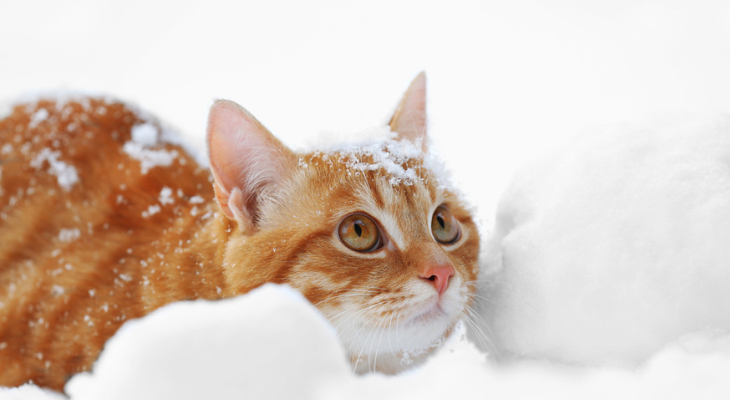
Cold Weather Tips for Your Pets
Painful slips and falls, frostbite, accidental poisonings, and other health woes can spell trouble for pets when it's cold outside. Fortunately, you can help your furry friends enjoy a safe, happy winter by following these cold weather recommendations.
Make Ice Removal a Priority
Just like you, your pet can injure itself by slipping on icy sidewalks, stairs, porches, and decks. Prevent broken bones, sprains, strains, and other injuries by removing ice promptly or making steps and other surfaces less slippery. Although salt provides an effective way to melt ice, the mineral can damage your pet's sensitive paws. Buy salt-free ice melt labeled safe for pets instead, or lay a no-slip mat over slippery surfaces. Special boots or booties with grippers on the soles will protect your pet's feet and reduce the risk of falls.
Protect Your Pet's Paws
Although you may not use salt to melt ice, chances are some of your neighbors do pour caustic ice melt products on their sidewalks. Prevent painful chemical burns by wiping your pet's paw pads with a moist cloth as soon as it returns inside. Boots and booties offer the ultimate protection from salt burns as well.
After a romp in the snow, inspect your pet's paws for clumps of snow and ice. In addition to being uncomfortable, ice and snow buildup can cause dangerous frostbite. Keep the hair around the paws trimmed to reduce clumps.
Get Rid of Obstacles in Your Yard
Do you know what lurks beneath the blanket of snow in your backyard? Snow covers obstacles that are normally easy to see and avoid, making a walk through the yard a little dangerous for you and your pet. Avoid injuries by putting lawn and garden equipment, buckets, stray pieces of wood, and other obstacles in your garage or home before the snow starts to fall. Family Handyman also recommends removing sharp pieces of ice and frozen snow that could cut or injure your pet.
Use Pet-Safe Antifreeze
Licking even a small amount of antifreeze could kill your pet. Although pets like the scent of antifreeze, ethylene glycol, a chemical in the product, can cause kidney failure or even death. Unfortunately, once you realize that your pet is sick, it may be too late to save it.
Prevent disaster by promptly cleaning up spilled or leaking antifreeze and repairing leaky car radiators. Replace standard motor vehicle antifreeze with pet-safe products. Keep in mind that pet-safe antifreeze is only helpful if you drain your old antifreeze before filling your radiator with the new product.
The ASPCA notes that ethylene glycol is also found in snow globes, some types of latex paint, portable basketball hoop bases, printer and pen inks, and products used to winterize toilets. If you happen to break or spill any of these objects, wipe up the liquid immediately.
If your pet does lick or drink antifreeze, take it to the veterinarian immediately. Signs of antifreeze poisoning include:
- Staggering or Coordination Problems
- Lack of Energy
- Excessive Thirst
- Frequent Urination
- Vomiting
- Low Body Temperature
- Seizures
- Coma
Keep Your Pet Warm
While many pets can safely enjoy outdoor time on cold days, some may need a little help to stay warm. A coat or sweater can be a good idea if you have a puppy, a dog with a thin coat, or small, older, frail, or ill pets. Dogster recommends buying waterproof outwear. Without a waterproof coating, coats and sweaters may quickly become wet if your pet happens to roll in the snow.
Although coats and sweaters are certainly helpful, some days are just too cold for outdoor playtime. If it's so cold that you don't want to linger outside, keep your pets indoors until temperatures rise. Think your dog is safe because it has a dog house? Unfortunately, dog houses don't provide enough protection from cold weather. While the houses do block the wind, they won't keep your dog warm. Your pet can easily develop frostbite if left outside on a cold day, even if it has a doghouse. Outdoor cats can suffer frostbite too, despite their fluffy coats. Cats should stay inside if the average temperature is lower than 45F, according to a Reader's Digest article.
Are your pets ready for the winter? If you have concerns about their health or physical condition, give us a call and we'll help you schedule an appointment with the veterinarian.
Sources:
Family Handyman: 10 Winter Dangers That Can Hurt Your Dog, 12/21/2021
https://www.familyhandyman.com/list/winter-dangers-dog/
ASPCA: Getting the Facts on the Dangers of Antifreeze and Your Pets, 2/27/2018
https://www.aspca.org/news/digging-deeper-getting-facts-dangers-antifreeze-and-your-pets
Dogster: Do Dogs Need Coats in the Winter? 7 Dog Coat Myt hs and Facts, 2/15/2021
https://www.dogster.com/lifestyle/do-dogs-need-coats-facts
American Veterinary Medical Association: Cold Weather Animal Safety
https://www.avma.org/resources-tools/pet-owners/petcare/cold-weather-animal-safety
Reader's Digest: When Is It Too Cold for Cats to Go Outside?, 7/20/2021
https://www.rd.com/article/when-is-it-too-cold-for-cats-to-go-outside/

